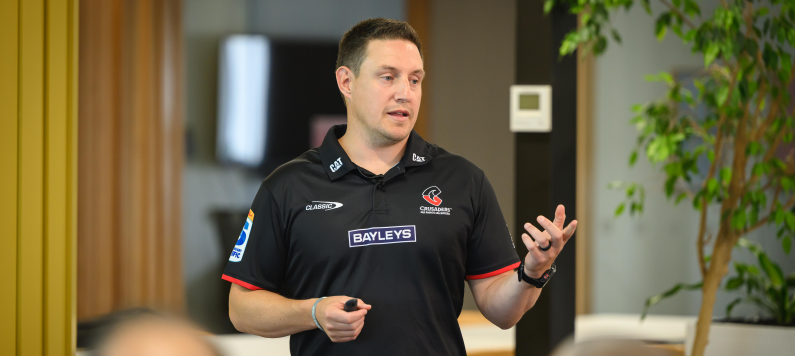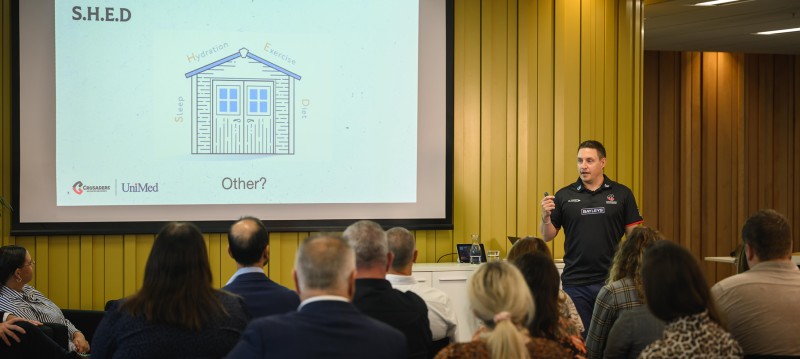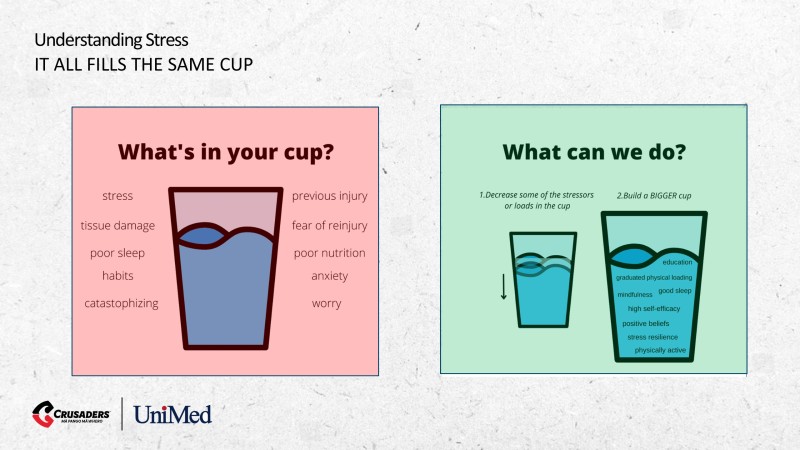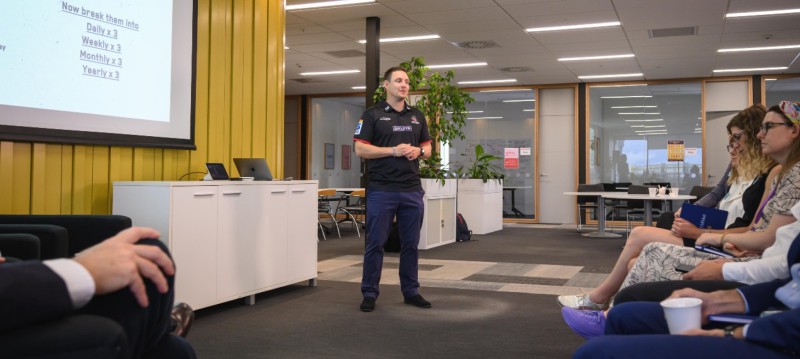
Building the Foundation: Performance Lessons from Elite Sports for Workplace Wellness
Published: 23 June 2025
By: Emma Turner
In our latest UniMed Breakfast Series event, Gareth Duder, Head of Performance for the Crusaders rugby team, shared powerful insights on wellbeing fundamentals that transcend the sports field and apply directly to workplace performance. Here's what HR and business leaders can learn from elite sports science.
Watch the talk with the Crusaders Head of Performance Gareth Duder
The Universal Foundation of Performance
When it comes to performance—whether on the rugby field or in the office—the foundation remains surprisingly consistent. As Gareth explains, "Every day, every week, athletes got to come in and nail these objectives, but they can't do it without a really strong foundation."
What's fascinating is that this foundation isn't about complex training regimens or specialised techniques. It's about basic human needs.
"It does not matter how many sets and reps, how much conditioning, how much running I give the guys, if they don't have their basic human needs sorted, they won't excel," he emphasises.
The Shed: Your Wellbeing Framework
Gareth introduced a powerful visual metaphor he calls "the shed", a simple structure representing the four pillars of wellbeing:
- Sleep: 7-10 hours (individual needs vary)
- Hydration: Minimum 2L of water daily (more if exercising)
- Exercise: Consistency over intensity
- Diet: Proper nutrition as fuel

What makes this framework particularly compelling is the interdependence between these elements. "If I remove the side off my shed and have really poor sleep, the roof falls in. If I think I can eat really poorly, again, the roof falls in," Gareth explains.
For workplace leaders, this offers a practical lens through which to view employee wellbeing programs. Rather than isolated initiatives targeting single aspects of health, comprehensive approaches supporting all four pillars create a more stable foundation.
Understanding Your Stress Cup
Another powerful concept Gareth shared was the "stress cup" metaphor. "We've only got one cup," he explains, demonstrating how various stressors—selection pressure, performance anxiety, injuries, results—all pour into the same limited container.
For HR and People & Capability Managers, this provides important context for understanding employee burnout. Work stress, personal challenges, health concerns, and financial pressures all fill the same cup. The solution? Either reduce what goes in or increase capacity.
"My job as a physical trainer is to build players’ capacity and make the cup bigger," Duder notes.
For organisations, this suggests two parallel approaches to wellbeing:
- Actively reduce unnecessary workplace stressors
- Help employees build resilience and capacity

The Autonomic Nervous System: Finding Balance
Gareth highlighted how our autonomic nervous system influences performance and recovery:
- Sympathetic System: "Fight or flight" – increased heart rate, shallow breathing, decreased digestion
- Parasympathetic System: "Rest and digest" – slower heart rate, controlled breathing, improved recovery
In elite sports, athletes often move rapidly between high-intensity training (sympathetic activation) and recovery periods, without proper transition. This same pattern appears in workplace environments.
"When we're looking at the nervous system, what would an average day look like for you? Where do you eat lunch? Are you giving your nervous system a break?" he challenges.
Simple strategies like mindful breathing (4-second inhale, hold for 4 seconds, 4-second exhale) can help transition between these states, allowing for better recovery and performance.
Proactive Wellbeing: Building Your Fence
One of the most impactful analogies Gareth shared was the cliff versus fence perspective on wellbeing.
"I only go to the doctor when something's wrong with my health, go to the chiropractor when I've got a sore back, or go to the psychiatrist when something's wrong with my mental health," he notes. "We've got to have these fences in place so we're not having to go for rides in ambulances."
This preventative approach to wellbeing mirrors what progressive organisations are implementing through proactive employee assistance programs, regular wellbeing check-ins, and supportive workplace cultures.
The 3-3-3-1 Activity: Prioritising Joy
Here is a simple yet powerful exercise for maintaining wellbeing:
- List 10 things that bring you happiness and joy
- Break them into:
-
- 3 things you could do daily
- 3 things you could do weekly
- 3 things you could do monthly
- 1 thing you could do annually
"Everyone’s list is going to look differently," Gareth explains. "If we're looking at the foundation of wellness, we've got to have that stuff that brings us happiness and joy in there as well. It can't all just be based around exercising every day."

Bringing Elite Performance Strategies to Your Workplace
The parallels between elite sports performance and workplace wellbeing are striking. Both environments require sustained high performance under pressure, both demand physical and mental resilience, and both depend on the same fundamental human needs.
For Kiwi businesses looking to enhance workplace wellbeing, these evidence-based approaches from elite sports science offer practical frameworks that can be implemented across teams and departments.
By focusing on the foundations—sleep, hydration, exercise, and nutrition—while actively building stress capacity and promoting balance between activation and recovery, organisations can create environments where employees don't just survive, but thrive.
What's one small change you could implement today to strengthen your organisation's wellbeing foundation?
This article is part of our ongoing series on workplace health and wellness. For more insights from industry experts, visit our blog or contact us to discuss how UniMed can support your organisation's wellbeing journey.

